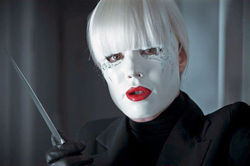DE PALMA CONTINUES TO BE FREQUENTLY MENTIONED
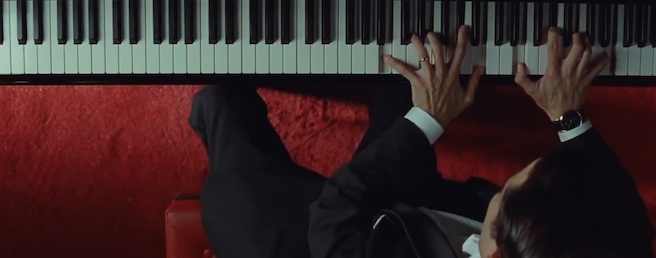
Eugenio Mira's Grand Piano has been available on demand for about a month, and is now slowly making its way to select theaters. The screenplay was written by Damien Chazelle, who had originally planned to direct it, according to Deadline's Brian Brooks. Chazelle did end up directing another script he wrote, Whiplash, a story about a drummer (played by Miles Teller) that was the talk of this year's Sundance Film Festival. Music seems to be Chazelle's thing, as his next film, "La La Land," is said to be a romantic musical about an actress and a jazz musician.
Regarding Grand Piano, Mira tells Brooks, "The irony of this movie is that 20 years ago it would be a mainstream movie. Richard Donner and the late John Frankenheimer are directors that I grew up with and I loved and for some reason, Hollywood has failed to deliver [today].”
After Grand Piano's world premiere at Austin's Fantastic Fest last September, we posted links to several reviews that frequently mentioned filmmakers such as Alfred Hitchcock, Brian De Palma, and Dario Argento. With the theatrical release this weekend, there are more such reviews popping up. Here are some more links:
Drew McWeeny, HitFix
"If you saw Eugenio Mira's earlier film Agnosia, then you may have already noticed his fondness for Brian De Palma. Anyone making thrillers who holds De Palma as part of the pantheon is already on my short list of people I like, but when you see how well Mira pulls it all together for Grand Piano, it's obvious that he's graduated to a different level with this film.
"I think it's very fair to compare this to Non-Stop, which I reviewed earlier today, since both of them are thrillers that take place over a compressed period of time in a fairly restrictive setting with a ticking clock. For both filmmakers, the exercise is the same. Can you keep the film somewhat plausible while ratcheting up the tension and convincing us that things could unfold like this? In the case of Grand Piano, the answer is a resounding yes, and I was delighted by just how playful and fun this is."
Glenn Dunks
"Eugenio Mira’s Grand Piano has a thoroughly ridiculous premise that borrows liberally from films such as Jan de Bont’s Speed, David Fincher’s Panic Room, and, most strikingly, Joel Schumacher’s Phone Booth. Much like that 2002 thriller with Colin Farrell as a man stuck in a telephone booth with a sniper’s rifle fixed on him, Mira’s films features a more-or-less single location with a lone man aware of the stakes and an escalating tension that is seemingly at odds with its intimate focus. Needless to say, it is a better film than Phone Booth, but that may be because the Spanish director (Grand Piano is in fact a Spain/US co-production) decided to reference Brian De Palma more than his most direct influence, Alfred Hitchcock.
"There’s a playfulness to Grand Piano that is deeply rewarding. It’s slick, 35mm lensing is drenched in bold colours, interesting compositions and in some sequences a sense of virtuosic camera trickery. Despite its compact confines, Mira’s film recalls the more heightened sense of Hitchcockian style that ebbs and flows throughout De Palma’s Blow Out, Body Double, or Dressed to Kill rather than the elegance of Hitchcock’s boutique thrills like Rope or The Lady Vanishes. It is a style that is perhaps too obvious for its own good, and yet one that works. It elevates the film and allows its moments of flight and fancy to not strike one as absurd or over-the-top. The entire film is working on a level of OTT sublime that is as much seat-grippingly intense as it is giggle-inducing."
A.A. Dowd, A.V. Club
"Mira, for his part, just gets his Brian De Palma on, most notably during a split-screen sequence that puts the harried hero on one side of the frame and a brutal murder on the other."
Kevin Taft, Edge on the Net
"A nifty little thriller that should cement director Eugenio Mira as 'the' director to watch, Grand Piano is filled with Hitchcockian suspense and gorgeous shades of Brian DePalma. With a compelling performance by Elijah Wood... the film is a noose-tightening 80 minutes of masterful direction... Credit must also go to cinematographer Unax Mendia who swoops around the stage like a magician making what could be a claustrophobic film feel spacious and alive. The music by Victor Reyes is flawless and, of course, Eugenio Mira handles the proceedings like an old school master. It’s a harrowing and nail-biting piece that is well worth tuning in for."
William Bibbiani, Crave Online
"Grand Piano is the more playful cousin of Chazelle’s other script this year, Whiplash (a film he also directed), a tale of a drumming prodigy and his abusive professor that also demonstrates the horrifying relationship between antagonism and perseverance. Chazelle seems fascinated by the notion that the ends might just justify the means, and that opposition to true villainy is a prerequisite for becoming a hero. He may be right but it’s a scary message to send to sensitive art students who have probably been bullied enough already, unless schools have changed dramatically since I attended them.
"So while Eugenio Mira may be having the time of his life finding ways for Selznick to secretly call for help, and in offing one-by-one the poor saps who might be able to save him, the real drama comes not from the enjoyable but contrived set-up, but rather the way that contrived set-up highlights the ongoing struggle for self-improvement, and the simply unfortunate need to be pushed in order to push back.
"To achieve these somewhat lofty goals, Mira crescendos Grand Piano’s suspense to ludicrous heights, formulating complex shots that Brian De Palma would be proud of, and setting the climactic battle against an impromptu, bizarre and deliciously overblown performance of 'Motherless Child.' What better way to finally stop the show than with a proper showstopper?"
Robert Levin, amNew York
"In short, Grand Piano is an extended set piece with tension that starts high and remains elevated throughout. Mira's camera spins, dives and soars throughout the concert hall, ranging from POV images to steady zooms and sustained long shots, with at least one of De Palma's favored split screens thrown in for good measure. You're constantly disoriented, hyper-aware of the stakes at hand."
Scott Pierce, MoviePilot
"It's being touted as Speed or Phone Booth at a concert hall, but in reality comes across as a mostly non-violent giallo mashup inspired by visual directors like Brian de Palma, Alfred Hitchcock, and Dario Argento. It's regimented and structured in a way that few movies today are despite its kitschy premise."
Eric D. Snider, Twitch
"I don't know what Elijah Wood's actual skill level is on the piano, but the way he fakes it here is nothing short of remarkable, and it speaks to his and Mira's commitment to taking the whole thing seriously. It would have been infinitely easier to avoid showing Wood's hands as much as possible, to focus on chest-level shots where we see his arms moving but not which specific keys he's hitting. Instead, Mira gives us long, unbroken takes of Wood banging away on the keyboard, our view of his hands unobstructed so we can see that what he's playing really could be the music we're hearing. The hand-synching, if that's what you call it -- sure, let's call it hand-synching -- is nearly flawless.
"Moreover, Mira and cinematographer Unax Mendia are constantly pulling off carefully orchestrated shots and marvelous feats of camera movement, applying the same type of sweeping, operatic bravura that Brian De Palma applies to everything he does. (I thought of Snake Eyes in particular.) There's something thrilling about seeing such technical precision used in the service of such lunacy. While the screenplay (by Damien Chazelle) is overly expository and larded with repeated dialogue, everything else about the film has energy and confidence and is perfectly capable of carrying you away if you'll go along with its fantastically goofy premise."




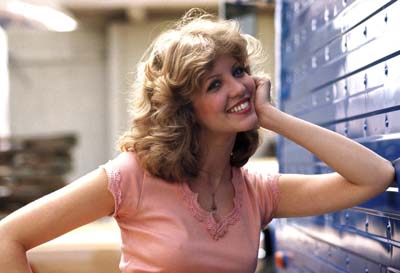
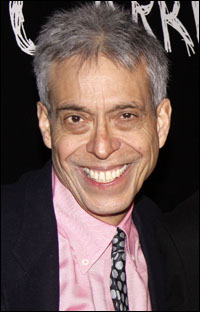 According to
According to 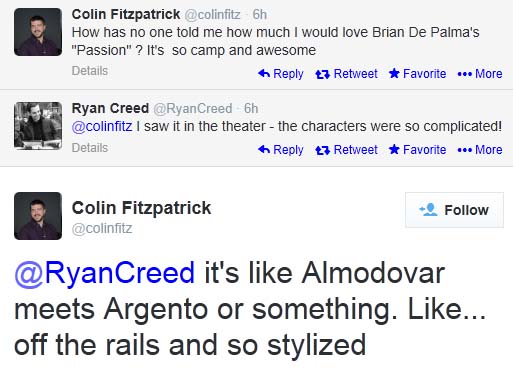
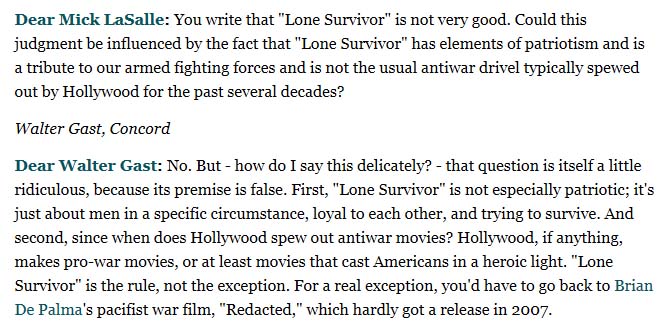
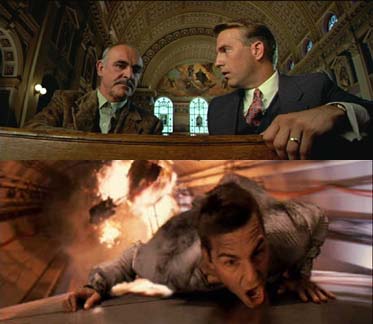 The theme of last night's Oscars telecast was "Heroes", and included time-filler montages of all kinds of movie heroes. One montage, introduced by Sally Field, included a clip of Ness and Malone talking in the church from Brian De Palma's The Untouchables. In another montage, introduced by Chris Evans, a quick-clip from De Palma's Mission: Impossible showed Ethan Hunt landing on top of the train after blasting himself from the helicopter.
The theme of last night's Oscars telecast was "Heroes", and included time-filler montages of all kinds of movie heroes. One montage, introduced by Sally Field, included a clip of Ness and Malone talking in the church from Brian De Palma's The Untouchables. In another montage, introduced by Chris Evans, a quick-clip from De Palma's Mission: Impossible showed Ethan Hunt landing on top of the train after blasting himself from the helicopter.
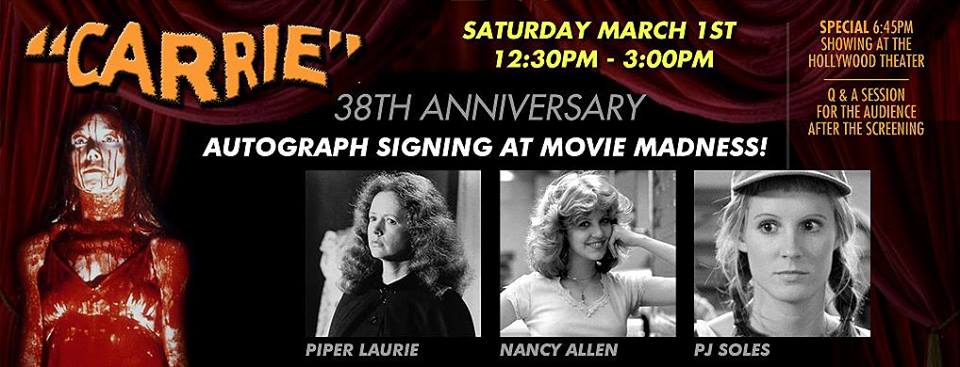

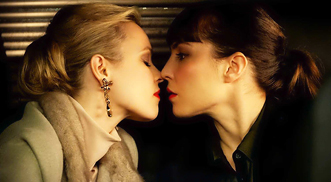 Brian De Palma's Passion will be included as part of a film series at the
Brian De Palma's Passion will be included as part of a film series at the 